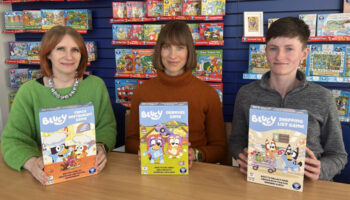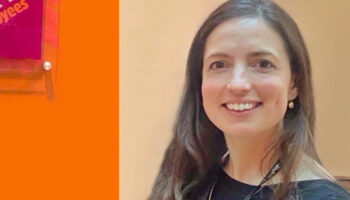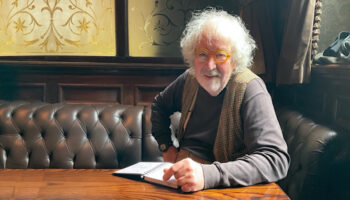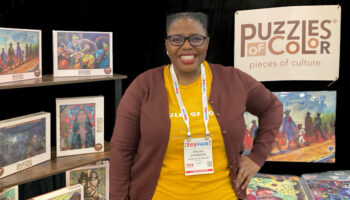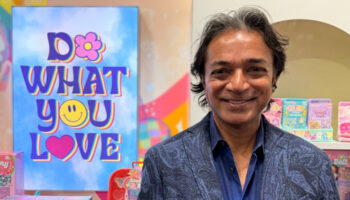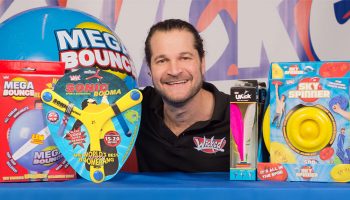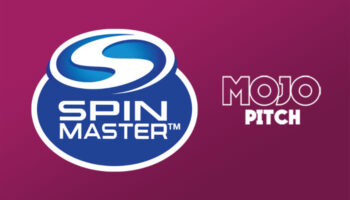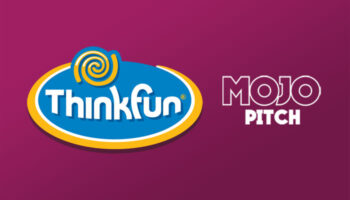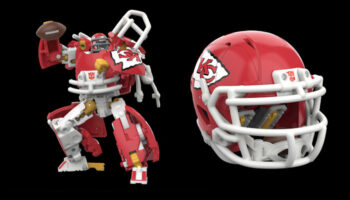“We knew there was something special here”: Eric Olsen, Tony Serebriany and David Blanchard talk Flip 7

Guys, it’s always great to chat – but I’m especially excited as we’re here to talk about a push-your-luck game that I’m already a big fan of: Flip 7. For anyone new to it, the basic idea is that players are flipping over cards one by one, hoping not to flip the same number twice. The twist here being that in the deck, there’s one 1 card, two 2s, three 3s – and so on… It’s great! Eric, how did this idea come about?
Eric Olsen, Inventor of Flip 7: It’s a great story – and one that goes back around 40 years or so. Back to when I was at high school… My group of friends didn’t get out much! We mostly sat around playing different card games. My best friend Rod – who is still my best friend today – is a creative guy and he came up with a game that we could bet on, that wasn’t a poker game. Instead of betting on who has the best poker hand, he said: “Let’s just put cards down one at a time and we’ll bet on whoever has the highest total.” That’s it! We all play a card, whoever has the highest card starts the betting… Pretty simple – and that alone was fun… But his big idea was that if you matched up another card, those cards would drop out. It made things really exciting – a great idea.
Fast forward 40 years, I never thought about game development until Covid. That’s when I designed my first game, Glyphics. That unlocked something in my brain and I started having all these other ideas… Including that game I played back in the day. It was such a cool mechanism – and the impetus for Flip 7.
Amazing. So you’ve remembered this cool mechanism… How did you approach building a new game around it?
Eric: I went and bought eight decks of regular cards and picked up where we left off back at high school, with it being a betting game… But I couldn’t make it work!
Oh!
Eric: My teenage son was my main play tester, and we realised no-one cared about the low cards. No-one got excited when they flipped over a 2, or a 3… They wanted the high numbers. So we did two things right away. We took out the betting – it just didn’t work. Then I included fewer low number cards, and more high number cards, because that’s what was resonating… Eventually it clicked – I should take that all the way to its natural conclusion, which was a deck with one 1, two 2s, three 3s, four 4s and so on… Then I was off and running.
From that point on, it was really just a case of tweaking it… But tweaking it a lot! We playtested it for two years and I can’t tell you how many variations it went through.

I like the idea that it feels like a classic because it is a classic – a mechanism 40 years in the making! How did the game find its way to The Op?
Eric: To date, I haven’t done any pitching events – which is unusual for someone in my shoes. When I had the idea for Glyphics, I reached out to Rena Nathanson at Bananagrams and she was super gracious. She put me on the path to GPI, and David was at GPI at the time. GPI’s Mike Fisher – the nicest guy in the world – started to give me some advice and information on publication. He said: “When your game is ready, let me know and I’ll put you in touch with some publishers.” And I didn’t realise how much of a big deal that was – that’s how new to all this I was!
I did reach back out to Mike and he connected me with David. We hit it off and David placed Glyphics for me with Big G within two or three months. So, when I showed him Flip – as it was called then – David was super excited about it and I left it to him to put the game out there.
So David, what about the game caught your eye?
David Blanchard, Director of Party & Family Games, The Op: With Glyphics, I knew Eric was coming at game design from a unique place. I knew he had a special talent; it’s why we placed Glyphics with a publisher so quickly. When he told me about Flip, I went to the store and bought eight packs of cards to make my own deck and the first time I played I knew there was something there. Eric kept playtesting the game with his group of friends as I was throwing in suggestions and he just took it to another level – to the point where I thought we had a winning card game on our hands.
I was pitching games to publishers in my previous role at GPI and I thought we’d place Flip straight away. I showed it to dozens of publishers and everyone thought it was great but for some weird reason no one signed it – it just kind of stuck around for a while. Looking back, I think publishers just weren’t looking for lower priced card games at that time. But one company I showed it to was The Op and the prototype was with them for a long time…

Tony, without wanting this to sound like a criticism, what took you so long?
Tony Serebriany, VP of Inventor Relations, The Op: Ha! Well, when I played Flip with David, the simplicity of it really resonated with me… It was one of those lightbulb moments…. There was something special here.
But from a publisher’s perspective, card games are one of the toughest spaces to get into because the price point of them is so low. In order to make any kind of money, you’ve got to do a huge amount of volume… And to do a huge amount of volume, you’ve got to get placed in the card game section… And to get placed in the card game section, you’re up against evergreen games like UNO, Phase 10, Skip-Bo… And that also now includes titles like Exploding Kittens and Taco Cat Goat Cheese Pizza. It’s nearly impossible to get a card game in there because of the volume of business these games are doing… Nobody wants to upset that.
When you put it like that!
Tony: Exactly! It means we’ve traditionally not invested in card games because it’s been so hard. Over the years, we had one card game that we felt confident in – Ratuki. That was a fast simultaneous play game; very different to Flip 7. The game did pretty well because it got sub-licensed by Hasbro for a year, but it was never able to stick because, card games are tough to do, and Hasbro changed the strategy of their games division.
So what made Flip 7 attractive enough for you to look past all those difficulties associated with card games?
Tony: There’s something special about it… The ease of entry point, the ease of explanation, the ease of set-up. As you know Billy, you can teach anybody this game without even explaining the rules. You start flipping cards in-front of people and you talk about it as you’re doing it… Then you’re off and running.
Why did this take some time to get over the line internally?
Tony: There were a small handful of us here that really loved this game. Getting it past that next layer of people internally is always the difficult challenge… We go through an approval process internally and we kept running into hurdles. So much so that at one point we were going to release it back to Eric and David because we couldn’t get it over that hump.
That said, we kept playing the game and we kept noodling with it because we loved it so much. There were three of us here – Casey Sershon, Brent Navratil and me – that kept refining and tweaking how we were playing it. We took the beauty of the game that Eric designed and kept finessing it. So even though we hadn’t signed the game yet, we were ‘developing’ it further! Once we felt we’d unlocked something, we presented it again internally and then there was a span of time… I don’t know how long it was…
Eric: I do!
Ha! Fill us in Eric!
Eric: Well, David was pitching it around for a year. I was getting a little frustrated and was playtesting some of my other designs when a friend said: “You should start your own game company – your first game should be Flip!” We didn’t know all that stuff that Tony said about breaking into the card game area – we thought we could do it! And Flip was well developed enough that I felt I could publish it myself.
I said to David: “If someone hasn’t picked Flip up by January, I’m going to do it myself.” He said: “Okay, that’s fair.” January rolls around, we hadn’t got an offer, so I start working on publishing Flip… I get an artist, we’re working on it and then – of course – in February, Tony reaches out.
Wow! You were in self-publish mode then, so what about The Op made you change direction?
Eric: It was too good an opportunity to pass up. They had been keeping me in the loop with the tweaks and changes they had made to the game and they’d ask how I felt about developments.
There was one change that I absolutely loved… In my original version of the game, everyone gets one card each, and then we said “3… 2… 1… FLIP!” and you could either flip another card and stay in or not flip a card which meant you were stopping. The Op changed that to going around the table and asking each player if they want to “hit” or “stay.” I considered doing that but felt players might lose interest. I should have tried it! It was a great call by the team at The Op!

Tony, were there other tweaks you made that you feel helped it break through the wall you were hitting previously?
Tony: I think it was just our perseverance. Because this game is just a deck a cards, the nuancing we were doing was minimal. We did some finessing to the Special Action cards, for example… The original game had the Flip Three and Freeze as one card, and when dealt it happened immediately to the player dealt the card, but you had the choice which of the two options you wanted. We opted to split this into two different cards and give some player agency in the game to choose yourself or force it onto another player. This dynamic also unlocked some amazing crescendo moments at the table.

The biggest change was what Eric mentioned about how the cards were distributed. That change unlocked something for all the players around the table. Just like a blackjack table, everyone is engaged around what cards the other players are pulling because it changes the odds around what you’re about to get. Plus, you’re invested because you’re watching to see if that player gets knocked out!
Absolutely! It’s good strategy to keep an eye on the cards other players pull – but it’s also good theatre!
Tony: The changes livened the energy at the table and it sped up the clean-up and distribution of cards for the next round. All these small adjustments really scratched an itch for anyone who was lukewarm on the game previously. And when David joined the team, his passion and commitment to the product helped us fast-track it.
David: Yeah, this journey has been a wild one for me because as Tony was finally signing the deal with Eric, things were changing for me at GPI. I ended up leaving the company after 17 years to form my own consulting and creative development company. I was just getting that off the ground when I got a call from Casey at The Op about this job opportunity that sounded perfect for me… Next thing you know, I’m The Op’s new Director of Party and Family Games! And as luck would have it, what’s the first game to hit my desk to work on but Flip 7! It was such good fortune…
Amazing!
David: But regardless of anything that I’ve had to do with Flip 7, I do want to point out that no-one has championed this game more than Tony and Casey have. Tony was taking it around the world, playing it with countless people at trade shows and providing feedback while Casey was rigorously playtesting it internally and helping refine the game mechanics. They’ve been in this industry a long time and seen a lot of games so it’s a testament to the game that it kept staying top of mind for them. They believed in it from the beginning.
Absolutely. And Eric – at the risk of showering Tony and David in more love – what was it about these guys and how they’ve been with you throughout this journey that cemented The Op as a great home for Flip 7?
Eric: I didn’t know anyone in the industry when I met David – I was skeptical! We talked, and talked again, and I trusted him. I liked him. Fast-forward a few years, I hadn’t met Tony – but I’d heard great things about Tony from several people. GPI had raved about The Op, their team and their reputation in the industry. If I was going to give my game away to someone, I wanted it to be someone who would take care of it and keep me in the loop with developments. Trust was the biggest thing.
It’s also great that they’re dominating the party space right now. Timing couldn’t be better! But that wasn’t the main thing… I went with them because of the trust factor. I had built a great relationship with David and I felt the same way about Tony.
Absolutely. And I think it’s always nice to be told how loved you are, especially outside of a funeral setting, and Tony and David are rightly beloved. I’ll join you in singing their praises, Eric. Now, I also wanted to ask about the look of the game. I imagine there’s all sorts of directions you could’ve gone in here… You could’ve added a theme or characters… Oh, Tony and David are groaning and grinning!
Tony: Been there, tried that!
David: We actually did show the game to some retailers early on who said: “The game is fun, but cards with numbers on them don’t sell well. Can you give it a theme?” So we tried that and gave it a cute theme, gave it a new name, trademarked it, mocked up a sample, and presented it back to them but we knew – and the retailer knew – that it just wasn’t right. Everyone preferred it without a theme.
Ha! On that, I’d describe Flip 7 as a themeless game with a lot of character. How did you decide on this look and feel?
David: Awesome – thank you for saying that. When it landed on my desk at The Op, the direction it was heading in was an ornate poker feel; like something you’d see from Theory11, not The Op… I liked the core idea behind that direction but the colours were very muted and it wasn’t really working. So we went back to the drawing board with the design and drew some inspiration from the original colour palette of the prototype I made with Eric. It looked much better, but still needed some pop, so we tried printing it on foil to see how that looked – and that was exactly what it needed. I want to sing the praises of O’Neil Mabile here. He was the graphic designer on this and it was the first time we had worked together – he totally amazed me with his talent and design sense and really nailed the feel we were going for…

Tony: Absolutely. And the look of the game adds to that feeling that it’s been around for so long. It has that old Vegas style.
Eric: It has the style of those old neon signs.
David: Yeah, we called it a ‘Boardwalk’ style.
It does look great – and it plays as good as it looks. Before I let you go, Flip 7 should be widely available soon right?
David: It is available now at Amazon, Barnes and Noble, and several other retailers, but will be distributed even more broadly in 2025. We sold out at both Gen Con and Essen this year and momentum is really building… You get so much entertainment and replayability from such a low-priced item; it’s very special.
Tony: It’ll be one of the games we’re demoing and selling at PAX Unplugged in December and will be available internationally soon, too! We have licensed the game to Catch Up Games in France and, thanks to our partnership with the Blackrock Games export team, it will be distributed in Germany by KOSMOS! It should be available in both territories in early 2025. Exciting things are happening…
In fact, we have some late breaking news that we should probably share… Flip 7 is one of TWO games from The Op that have been nominated for a ‘Game of the Year’ TOTY!

Congratulations – and well deserved. It’s a terrific game, and one that’s exciting to share with people too.
Tony: Thank you. And Billy, your experience of the game plays into why so many people want to play and talk about the game. It touches such an interesting aspect of the play experience in that it’s so easy to share – and it’s a game you want to share… Even when you have no vested interest in it. There are other games I do that with too because they’re just so easy and good. Like Trio! I love that little game. Cabanga is another one. Flip 7 is another. It’s going to be around a long time and it’s going to be played by a lot of people… It’s fantastic.
Absolutely. Thanks again guys. Always a pleasure.
–
To stay in the loop with the latest news, interviews and features from the world of toy and game design, sign up to our weekly newsletter here





